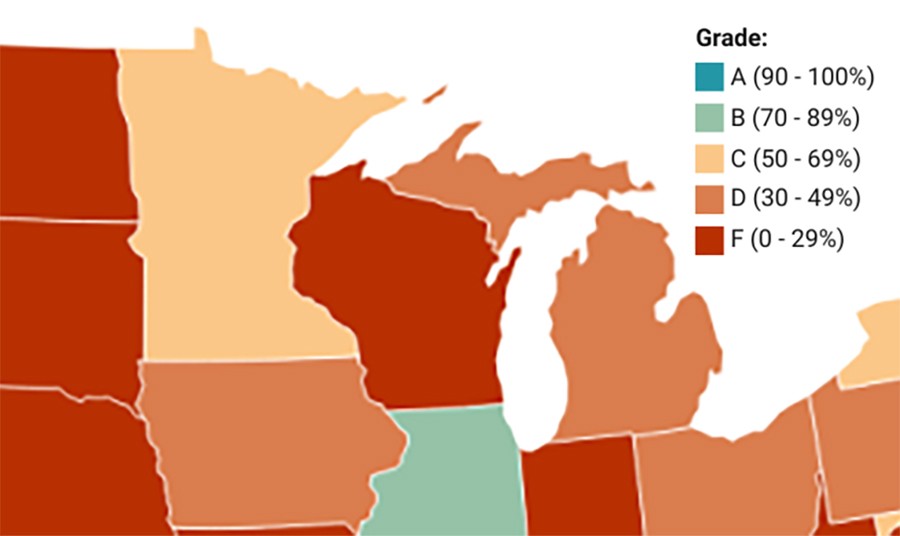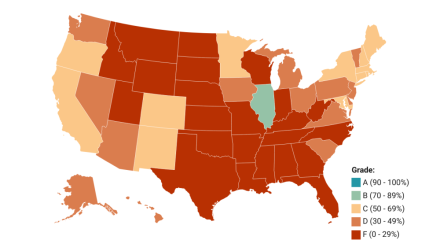
Welcome to Badger Energy Bulletin, a weekly newsletter for energy nerds with a focus on the Badger State.
When it comes to providing affordable, reliable, and clean electricity — and empowering citizens to share the economic benefits — Wisconsin is failing.
But then so are nearly half the United States, according to the Institute for Local Self Reliance's annual Community Power Scorecard, which rates every state based on laws that favor communities over utility companies.
ILSR rates each state on 18 metrics. Some are arcane: You've probably never heard of hosting capacity analysis, but making such data publicly available lets independent power producers make better decisions. Others seem more straightforward: Should utilities be allowed to charge ratepayers for their lobbying expenses? (They are in Wisconsin.)
The highest-scoring states support “locally owned clean energy and competitive access to the grid, empower communities to be more self-reliant, and ensure that everyone benefits from clean energy,” according to the Minnesota-based nonprofit's rating guide.
States are also rewarded for holding utilities accountable and protecting consumers and competitors from abuses of monopoly power.
“The things we’re advocating for are pro competition,” said Ingrid Behrsin, a senior researcher with ILSR's Energy Democracy Initiative and author of the report.
Wisconsin was one of 23 states that got an F, though only nine scored lower. What really sticks out, though, is how it compares to its neighbors.
Illinois is at the top of the class, the only state to earn a B, scoring 76%. Minnesota earned a solid C, while Iowa and Michigan still managed to pass with Ds.

So why did Wisconsin flunk?
While the Badger state scored a big fat zero in 11 of the 18 policy areas, Behrsin said three stand out in contrast to neighboring states:
- Third-party ownership: Basically the right to rent solar panels, this is a way for customers who lack cash or tax liabilities to access solar energy. But utilities have used a gray area in state law to block it, arguing only regulated monopolies can sell electricity. Advocates have long sought for clarity, but lawmakers, utility regulators, and the courts have so far declined to provide it.
- Franchise authority: Illinois, Iowa, and Minnesota give municipalities the right to negotiate contracts with utilities and collect fees in exchange for use of public rights-of-way. Minneapolis used this authority to fund a clean energy program.
- Interconnection: These are the rules about hooking up customer-hosted generation — such as solar panels, batteries, or generators that run on excess industrial heat.
The scorecard does not reflect changes to the interconnection rules that were adopted last year and generally hailed by renewable energy advocates as an improvement.
Behrsin also noted growing momentum for community solar. A bill authorizing utility customers to buy energy from solar projects not owned by a regulated utility failed to pass last year, though its authors were optimistic about its future prospects.
"It could be a big boost for the state's score if done well," Behrsin said.
On the other hand, lawmakers have once again introduced a bill to limit competition on high-voltage transmission line projects, which ILSR considers bad for energy democracy.
While opposed by a coalition of consumer advocates and free market conservative groups, this time around the bill has garnered support from multiple trade unions and business lobbies.
